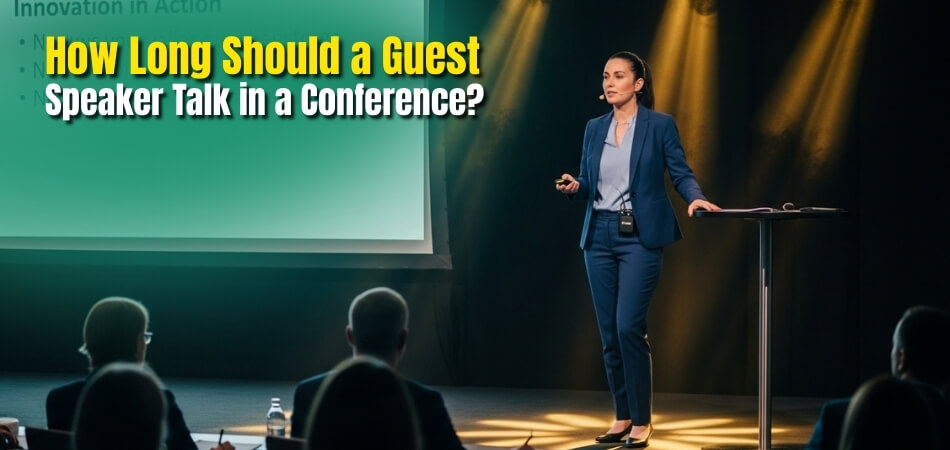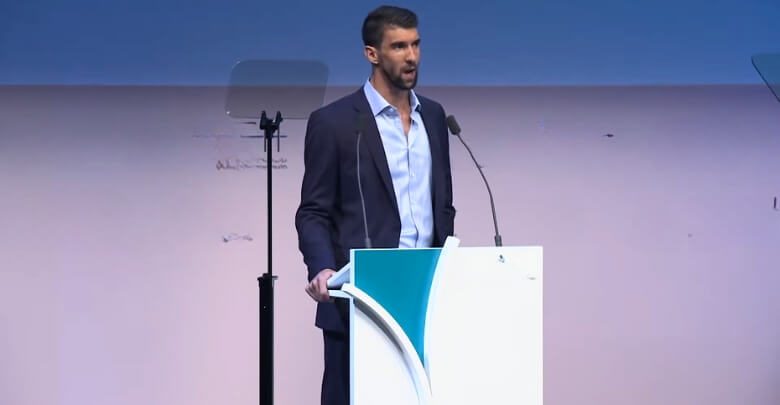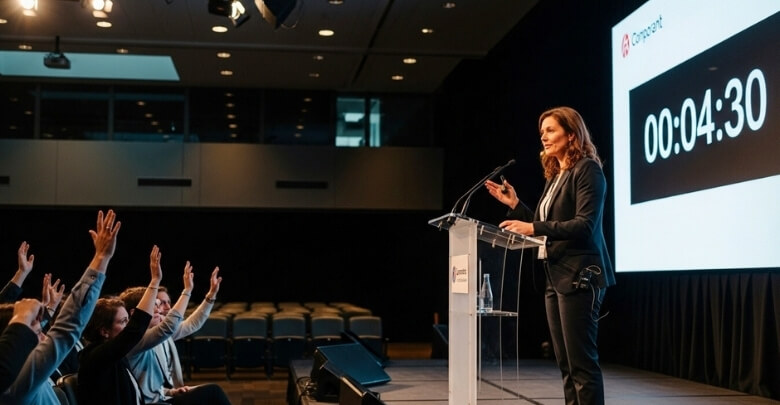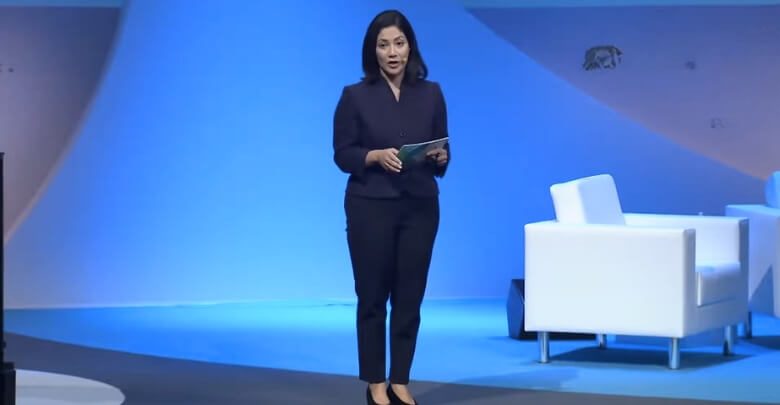Every conference organizer and speaker faces the same challenge: How long should a guest speaker talk in a conference? The length of a speech can make or break an event, shaping audience engagement, overall energy, and the success of the program. A talk that drags on risks losing attention, while one that’s too short may leave the audience wanting more.
Typically, a guest speaker should aim for 20 to 45 minutes, depending on the format and purpose. Some events may ask for a quick 15-minute presentation, while keynote addresses can stretch closer to an hour. The goal is always the same: to deliver value while respecting the audience’s time and focus.
In this article, we’ll look at different speaking formats, the factors that affect talk length, and practical tools like a script planning template and a preparation checklist. Whether you’re organizing a conference or stepping on stage as a guest speaker, these insights will help you hit the sweet spot for timing.
How Long Should a Guest Speaker Talk in a Conference?
There’s no one-size-fits-all answer to how long a guest speaker should talk. A presentation that feels perfect in one setting might feel too short or too long in another. The ideal length depends on striking the right balance between delivering value and keeping the audience engaged. Rather than focusing on a fixed number of minutes, it’s better to consider the factors that shape what works best for each event. Let’s break them down one by one.

Audience Attention Span
Most audiences can stay fully engaged for around 20–45 minutes, after which focus begins to fade. Guest speakers should aim to deliver their strongest points within this window to ensure their message is heard and remembered.
Complexity of the Topic
A straightforward motivational talk may only need 20 minutes, while a detailed technical or professional subject could require 30–45 minutes to explain thoroughly. The depth of the material should guide the amount of time allocated.
Event Format and Agenda
The overall structure of the event often determines how long a guest speaker should talk. For example, many conferences in Canada offer shorter slots to multiple guest speakers during parallel sessions, while reserving longer time frames for keynote speakers who carry the main theme of the event.
Speaker’s Style and Delivery
Some speakers are natural storytellers who need more time to build narratives, while others communicate effectively with fewer words. The presenter’s delivery style should align with the allocated time to avoid feeling rushed or stretched.
Audience Size and Setting
In large auditoriums, longer talks of 30–45 minutes may be appropriate to create a sense of presence and value. In smaller, more intimate sessions, a shorter 15–20 minute talk often feels more personal and effective.
Inclusion of Q&A or Interaction
If the session includes audience questions, discussions, or interactive activities, the speaking portion should be shortened accordingly. For example, a 30-minute slot may include 20 minutes of speaking and 10 minutes of Q&A.
Types of Guest Speaking Formats & Recommended Durations
Guest speaker talks don’t all follow the same format or length. The time given often depends on the event’s goals and structure. From short lightning talks to extended workshops, each format comes with its own timing expectations that speakers should understand.
Lightning Talks (5–10 Minutes)
Lightning talks are short, high-energy presentations designed to deliver one strong idea quickly. They’re perfect for events with multiple speakers or for audiences who prefer fast, focused insights. Because time is limited, speakers must get straight to the point without unnecessary background or detail.
Breakout Sessions (15–30 Minutes)
Breakout sessions are smaller, more focused talks that dive into a specific theme or skill. These sessions usually include some interaction, like Q&A or group discussion. A 15–30 minute slot is ideal for providing enough depth while still allowing time for audience participation.
Standard Guest Presentations (20–45 Minutes)
This is the most common length for guest speakers at conferences. A 20–45 minute talk provides enough time to introduce a topic, expand on two or three key points, and end with a strong conclusion. It’s long enough to be meaningful without risking a drop in audience attention.
Keynote Speeches (30–60 Minutes)
Keynotes are typically the highlight of a conference and often open or close the event. They are designed to inspire, motivate, and set the tone for the audience. Because they carry greater weight, they often run between 30 and 60 minutes, though the best keynotes still maintain a clear focus and engaging delivery.
Workshops (60+ Minutes)
Workshops are designed for hands-on learning and active participation rather than just listening. Running for 60 minutes or more, they include interactive exercises, group discussions, and practical takeaways. The extended time allows participants to dive deeper and apply what they’re learning on the spot.
Common Mistakes Guest Speakers Make With Timing
Even experienced speakers can struggle with timing. Some go over their slot and frustrate organizers, while others finish too quickly and leave the audience unsatisfied. Avoiding these mistakes ensures your talk feels polished and respectful of both the program and the listeners.
Going Overtime
One of the most common mistakes is running beyond the allotted time. This not only disrupts the event schedule but also risks losing audience attention. A strong talk leaves people engaged and curious, not glancing at their watches because you’ve spoken too long.
Trying to Cover Too Much
Some speakers attempt to include everything they know about a topic, which quickly overwhelms the audience. A better approach is to focus on two or three key points and develop them fully. This keeps your talk manageable and ensures your message is clear and memorable.
Speaking Too Quickly
Nerves often push speakers to rush through their material, which reduces clarity and makes it hard for listeners to absorb information. Even if you finish on time, a rushed delivery feels unbalanced. Practicing with a timer helps you slow down and deliver at a steady pace.
Speaking Too Slowly
The opposite mistake is stretching content with a slow pace, long pauses, or unnecessary repetition. While pauses are valuable, overusing them can make your talk drag. Aim for a rhythm that keeps the audience engaged while still allowing time for emphasis and reflection.
Ignoring Pauses and Transitions
Some speakers jump from point to point without giving the audience time to process. Smooth transitions and intentional pauses not only make your talk easier to follow but also give you a chance to catch your breath and reset your energy.
Overloading Slides With Text
Slides should support your talk, not compete with it. A common mistake is putting too much text on the screen, which slows delivery and divides attention. Use slides for visuals or key points, and let your spoken words carry the detail.
Not Preparing a Shorter Backup Version
Conferences often run behind schedule, and organizers may ask speakers to cut their time. Without a shorter version ready, you risk stumbling or cutting key ideas on the spot. Having a condensed outline ensures you can still deliver your main message under time pressure.
Forgetting to Rehearse Aloud
Reading through your talk silently doesn’t reflect how long it actually takes to present. Many speakers only realize they’re off time when they’re on stage. Rehearsing aloud with a timer gives you a realistic measure and builds confidence in your delivery.
Practical Tips for Effective Time Management for Speakers
Even the best-prepared talk can fall flat if you don’t manage your time wisely. Good time management ensures you stay within your slot, maintain audience attention, and leave space for interaction if required. Here are some practical tips every speaker can apply:
Break Your Talk Into Segments
Instead of treating your talk as one long block, divide it into clear sections — introduction, main points, and conclusion. Assign specific minutes to each part so you always know where you should be in your timeline. This structure keeps you organized and prevents last-minute rushing.
Use the 90% Rule
When planning your presentation, always aim to use only about 90% of your allotted time. For example, if you’re given 30 minutes, prepare for 27. The remaining time provides a comfortable buffer for pauses, transitions, or unexpected audience interaction without risking an overrun.
Time Yourself in Rehearsals
Reading your presentation silently is never enough. Practice it aloud with a stopwatch to measure your actual pace. Doing this multiple times helps you spot sections that need trimming or expanding. Over time, your delivery becomes smoother, and your timing more predictable and consistent.
Mark Cues in Your Notes
Add timing cues or checkpoints in your notes or slides. For example, note where you should be at the 10-minute or 20-minute mark. These cues act as reminders, helping you adjust your pace during the talk if you notice you’re running behind or ahead.
Prepare a Shorter Version
Conference schedules can change unexpectedly, and speakers are often asked to cut their time. Always prepare a shorter version of your talk that still delivers your key points. This ensures you’re flexible and professional, even under pressure from last-minute adjustments.
Stay Aware of the Clock
No matter how confident you are, always stay mindful of time while speaking. Many venues provide timers, but it’s smart to check your own watch or device discreetly. Time awareness ensures you remain in control and maintain credibility throughout your presentation.
Balance Openings With Time Awareness
Strong openings are vital, but they shouldn’t consume too much of your slot. Using professional approaches to speaker introductions can help keep your start engaging yet efficient, ensuring you have enough time to dive into your main content and conclude with impact.
How to Handle Q&A Within Your Time?
Audience questions are often one of the most engaging parts of a talk, but they can also create timing challenges if not managed well. Striking a balance between delivering your prepared content and giving space for interaction ensures your session feels both complete and engaging.
Decide If Q&A Is Part of Your Slot
Some conferences include Q&A within your speaking time, while others schedule it separately. Always clarify this with organizers before preparing your talk. If it’s part of your slot, plan to shorten your presentation so you can dedicate a few minutes to questions.
Set Clear Boundaries for Questions
When you invite questions, let the audience know how much time is available. Saying something like, “We have time for two quick questions,” signals limits without discouraging participation. Clear boundaries help you stay in control and avoid letting Q&A stretch too long.
Keep Answers Focused and Concise
Audience questions can sometimes take you off track if answers become too detailed. Focus on responding directly and briefly, offering clear value without diving into long side discussions. If needed, invite the person to continue the conversation with you after the session.
Use a Timer or Moderator Support
Having a moderator track the clock or gently signal when time is nearly up is invaluable. If you’re alone, keep your own timer visible. This ensures you don’t let an engaging discussion unintentionally push your presentation past the scheduled limit.
Always Protect Your Closing Remarks
One common mistake is letting Q&A eat into your conclusion. Always reserve at least a minute or two to wrap up with your own final words. This ensures you leave the audience with your core message, not just the last question asked.
How to Adjust Talk Length for Virtual and Hybrid Conferences?
Speaking at virtual or hybrid conferences requires a slightly different approach to timing. Online audiences have shorter attention spans and face more distractions compared to in-person settings. Adjusting your talk length and structure ensures your presentation is engaging, effective, and respectful of your audience’s time.
Keep Sessions Shorter
Online participants rarely stay engaged for very long. Instead of speaking for 45–60 minutes, aim for 15–25 minutes of focused delivery. If you have more material, divide it into multiple shorter sessions that feel easier to follow and less tiring for your audience.
Built-in Interaction
Without the energy of a live room, online talks can quickly feel flat. Add polls, Q&A segments, or interactive prompts to keep participants involved. Interaction helps reset attention, making people feel part of the session instead of passive listeners.
Use Visual Variety
Virtual presentations demand more visual support. Use slides with images, charts, or short videos to maintain engagement. Avoid text-heavy slides — visuals should highlight your points, not compete with your voice. This balance makes your talk dynamic and easier to follow online.
Adapt for Hybrid Audiences
Hybrid events require attention to both in-person and online participants. Balance your energy between the live stage and the camera, making each group feel included. Talks in this setting work best at 20–30 minutes, offering enough depth without overstretching attention spans.
Allow Breaks for Longer Sessions
If your slot goes beyond 30 minutes, include small breaks or transition points. Even a short pause to change slides, ask a question, or reset the topic gives participants a mental breather. This helps them stay focused through longer content.
Rehearse With Tech in Mind
Timing issues often come from technical glitches. Rehearse your talk while sharing slides, using your mic, and managing any virtual tools. This ensures you know how long transitions or interactions take and prevents your presentation from running over time.
End With a Space for Questions
Virtual audiences often have questions but may hesitate to interrupt. Plan your talk so you finish a few minutes early, leaving room for Q&A. This keeps your timing on track while giving attendees a chance to engage more directly with you.
What Is the Fee of a Professional Guest Speaker?
Hiring a guest speaker is an investment in the success of any event. Costs can vary widely depending on the speaker’s reputation, experience, and the scale of the conference. While the standard fees for professional guest speakers often fall within certain ranges, the exact amount depends on factors like expertise, demand, and event type.
Local and Emerging Speakers
Smaller events often work with local experts or new professionals who are still building their speaking profiles. Their fees are generally modest, usually starting around $500 and sometimes going up to $2,500, depending on the size of the audience and the visibility of the event.
Mid-level Professional Speakers
Speakers with established credibility and several years of industry experience often command higher fees. In most cases, their rates range between $5,000 and $15,000, reflecting both their proven expertise and their ability to engage larger or more specialized audiences.
High-Profile and Celebrity Speakers
For major conferences or international summits, organizers may seek bestselling authors, CEOs, or public figures. Their fees typically start at around $20,000 and can climb well over $100,000 for celebrity-level speakers who bring prestige and attract significant attention.
Additional Costs to Consider
Beyond the speaking fee, organizers are usually expected to cover travel, lodging, and meals. Some speakers may also charge extra for add-ons like workshops, panel participation, or book signings. Including these expenses in the budget helps ensure a smooth agreement.
Frequently Asked Questions
Determining the ideal length of a guest speaker’s talk at a conference can spark a variety of questions. The right duration ensures that attendees stay engaged and that speakers deliver maximum value. Here are some frequently asked questions about how long guest speakers should talk at conferences.
Can Guest Speakers Have More than One Session During a Conference?
Yes, guest speakers can have multiple sessions, especially if they offer different insights into each one. For instance, they might start with a keynote presentation and later host a workshop or panel discussion. This approach allows the audience to gain a broader perspective and keeps the event dynamic.
Should Guest Speakers Include a Q&A Session in Their Talk?
Including a Q&A session is highly encouraged, as it allows for interactive engagement with the audience. The Q&A session can be part of the speaker’s allotted time or added as an extension to their talk. It fosters a deeper understanding of the topic and gives attendees a chance to clarify doubts or explore topics further.
Is It Necessary to Set a Time Limit for Experienced Speakers?
Yes, setting a time limit is essential, even for experienced speakers. It ensures that the conference stays on schedule and prevents any speaker from overshadowing others. It also helps keep the audience’s attention focused, as even the most engaging content can lose impact if it runs too long.
Can Guest Speakers Use Multimedia During Their Presentations?
Absolutely, using multimedia can enhance the delivery of the talk. Visual aids, videos, or slides can help clarify points and make the presentation more engaging. However, it’s important for speakers to balance multimedia usage with verbal communication to maintain audience engagement.
Should a Guest Speaker’s Talk Length Vary by Audience Size?
While the length of the talk generally remains the same, the delivery style may change based on audience size. Smaller audiences may benefit from more intimate, discussion-based talks, while larger audiences may need more structured presentations. Adjusting the approach based on the crowd size can make the talk more effective.
Final Thoughts
Deciding the ideal length for a guest speaker’s talk is vital for keeping your audience engaged and ensuring an impactful session. When considering how long should a guest speaker talk in a conference, aim for a timeframe that keeps the energy high and the message clear.
Presentations typically work best when kept between 20 and 45 minutes, allowing speakers to dive deep into the topic while holding the audience’s attention. Adding a brief Q&A session further enriches the experience.
The right duration not only respects the speaker’s expertise but also meets the audience’s expectations. By keeping talks concise and focused, you ensure a lively, memorable event for all participants.








